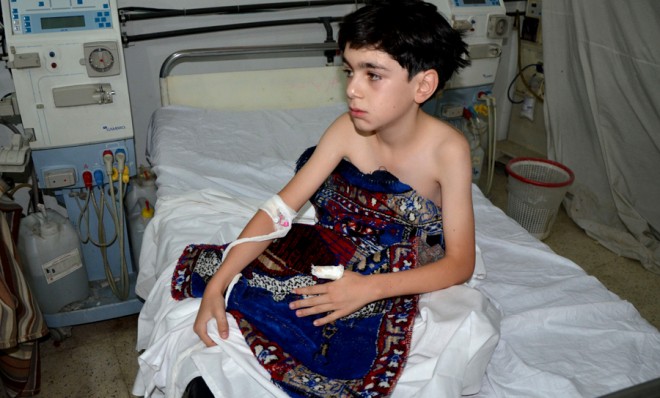If Syria's deadly poison gas attack doesn't cross Obama's 'red line,' what does?
Activists charge that up to 1,300 people were killed Wednesday in a horrific chemical weapons attack near Damascus

A free daily email with the biggest news stories of the day – and the best features from TheWeek.com
You are now subscribed
Your newsletter sign-up was successful
Almost exactly a year since President Barack Obama warned the Syrian government against crossing the "red line" of using chemical weapons, activists claim that hundreds of people were killed in a poisonous gas attack Wednesday morning in the Damascus suburb of Ghouta.
If true, it would be the deadliest chemical attack in the bloody civil war that the U.N. says has already killed more than 100,000 people and, as journalist Kety Shapazian notes, one of the worst chemical weapons attacks in modern history:
Reports from the scene are mixed. Rebels and activists have claimed anywhere from 213 to 1,300 people were killed when rockets carrying "poisonous gas" were launched around 3 a.m. by President Bashar al-Assad's military forces.
The Week
Escape your echo chamber. Get the facts behind the news, plus analysis from multiple perspectives.

Sign up for The Week's Free Newsletters
From our morning news briefing to a weekly Good News Newsletter, get the best of The Week delivered directly to your inbox.
From our morning news briefing to a weekly Good News Newsletter, get the best of The Week delivered directly to your inbox.
"Many of the casualties are women and children," a nurse at the site told Reuters. "They arrived with their pupils constricted, cold limbs and foam in their mouths. The doctors say these are typical symptoms of nerve gas victims."
Unconfirmed amateur photos and videos purport to show the aftermath of the attack. (WARNING: These videos are disturbing and graphic.)

The Syrian government has denied launching an attack on Ghouta, claiming on state TV that there was "no truth whatsoever" to the reports.
So far, the international community has reacted with a mixture of caution and outrage. William Hague, Britain's foreign secretary, said that if the reports of the attack were verified, "it would mark a shocking escalation in the use of chemical weapons in Syria." The European Union has called for a "thorough and immediate" inspection of the attack site.
A free daily email with the biggest news stories of the day – and the best features from TheWeek.com
The White House issued a statement saying that it was "deeply concerned" about the reports and formally requested that the U.N. "urgently investigate this new allegation."
In June, months after an alleged chemical strike in the village of Khan al-Assal in northern Syria, the Obama administration was ready to announce that it had "high confidence" that the Assad regime had used chemical weapons.
That led to fighting in Congress over whether to arm the rebels, with some lawmakers concerned about sending weapons to opposition groups like Al-Nusra Front, which has been linked to al Qaeda. In July, rebels started reporting receiving shipments of small arms from the United States.
The handwringing over sending small arms to Syria shows how reluctant the White House is to support opposition groups with cruise missiles or other forms of direct military aid.
"Syria today is not about choosing between two sides but rather about choosing one among many sides," Gen. Martin Dempsey, chairman of the Joint Chiefs of Staff, wrote in a letter to Rep. Eliot Engel (D-N.Y.) on Monday. "It is my belief that the side we choose must be ready to promote their interests and ours when the balance shifts in their favor. Today, they are not."
That cautious approach has irked activist groups and politicians like Sen. John McCain (R-Ariz.). Now, with reports of hundreds reported dead, the pressure on Obama to punish Syria for crossing the "red line" is only increasing:
Jeffrey Goldberg, writing at Bloomberg, also put blame on the president for not responding more strongly to previous reports of chemical weapons attacks.
... Assad believes that no one — not the UN, not President Obama, not other Western powers, not the Arab League — will do a damn thing to stop him.
There is a good chance he is correct. [Bloomberg]
Activists in Syria have been more blunt in their criticism of the U.S. and U.N. responses to the attacks. It's particularly striking that the reported attack in Ghouta comes mere days after a 20-person U.N. team entered the country to investigate allegations of past uses of chemical weapons.
"This is a massacre by chemical weapons," Mohammed Saeed told the Associated Press. "The visit by the U.N. team is a joke. ... Bashar is using the weapons and telling the world that he does not care."
Keith Wagstaff is a staff writer at TheWeek.com covering politics and current events. He has previously written for such publications as TIME, Details, VICE, and the Village Voice.
-
 The ‘ravenous’ demand for Cornish minerals
The ‘ravenous’ demand for Cornish mineralsUnder the Radar Growing need for critical minerals to power tech has intensified ‘appetite’ for lithium, which could be a ‘huge boon’ for local economy
-
 Why are election experts taking Trump’s midterm threats seriously?
Why are election experts taking Trump’s midterm threats seriously?IN THE SPOTLIGHT As the president muses about polling place deployments and a centralized electoral system aimed at one-party control, lawmakers are taking this administration at its word
-
 ‘Restaurateurs have become millionaires’
‘Restaurateurs have become millionaires’Instant Opinion Opinion, comment and editorials of the day